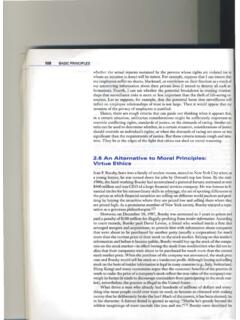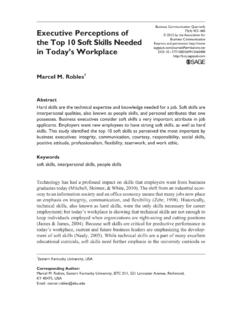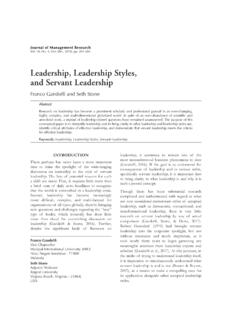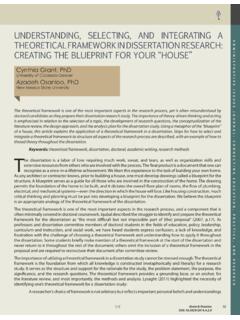Transcription of Principles of Ethical Leadership - Southeastern Homepages
1 1 Principles of Ethical Leadership The five Principles of Ethical Leadership presented here can be traced back to Aristotle. The importance of these Principles has been discussed in a variety of disciplines, including biomedical ethics (Beauchamp & Childress, 1994), business ethics (Beauchamp & Bowie, 1988), counseling psychology (Kitchener, 1984), and Leadership education (Komives, Lucas, & McMahon, 1998), to name a few. Although not exhaustive, these Principles provide a foundation for the development of sound Ethical Leadership : respect, service, justice, honesty, and community . Ethical leaders Respect Others Philosopher Immanuel Kant (1724-1804) argued that it is our duty to treat others with respect. To do so means always to treat others as ends in themselves and never as means to ends. As Beauchamp and Bowie (1988, p. 37) pointed out, Persons must be treated as having their own autonomously established goals and must never be treated purely as the means to another s personal goals.
2 These writers then suggested that treating others as ends rather than as means requires that we treat other people s decisions and values with respect: failing to do so would signify that we were treating them as a means to our own ends. Leaders who respect others also allow them to be themselves, with creative wants and desires. They approach other people with a sense of their unconditional worth and valuable individual differences (Kitchener, 1984). Respect includes giving credence to others ideas and confirming them as human beings. At times, it may require that leaders defer to others. As Burns (1978) suggested, leaders should nurture followers in becoming aware of their own needs, values, and purposes, and assist followers in integrating these with the leader s needs, values, and purposes. Respect for others is a complex ethic that is similar to but goes deeper than the kind of respect that parents teach little children.
3 Respect means that a leader listens closely to opposing points of view. It means treating subordinates in ways that confirm their beliefs, attitudes, and values. When a leader exhibits respect to subordinates, subordinates can feel competent about their work. In short, leaders who show respect treat others as worthy human beings. Ethical Leaders Serve Others A number of Ethical theories emphasize a concern for the interests of others ( Ethical altruism). The service principle clearly is an example of altruism. Leaders who serve are altruistic: they place their followers welfare foremost in their plans. In the workplace, altruistic service behavior can be observed in activities such as mentoring, empowerment behaviors, team building, and citizenship behaviors, to name a few (Kanungo & Mendonca, 1996). The leader s Ethical responsibility to serve others is very similar to the Ethical principle in health care of beneficence.
4 Beneficence is derived from the Hippocratic tradition, which holds that health professionals ought to make choices that benefit patients. In a general way, beneficence asserts that providers have a duty to help others pursue their own legitimate interests and goals (Beauchamp & Childress, 1994). Like health professionals, Ethical leaders have a responsibility to attend to others, be of service to them, and make decisions pertaining to them that are beneficial and not harmful to their welfare. 2 In the past decade, the service principle has received a great deal of emphasis in the Leadership literature. It is clearly evident in the writings of Block (1993), Covey (1990), De Pree (1989), Gilligan (1982), Greenleaf (1977), and Kouzes and Posner (1995), all of whom maintained that attending to others is the primary building block of moral Leadership . Further emphasis on service can be observed in the work of Senge (1990) in his well-recognized writing on learning organizations.
5 Senge contended that one of the important tasks of leaders in learning organizations is to be the steward (servant) of the vision within the organization. Being a steward means clarifying and nurturing a vision that is greater than oneself. This means not being self-centered, but rather integrating one s self or vision with that of others in the organization. Effective leaders see their own personal vision as an important part of something larger than themselves a part of the organization and the community at large. In short, whether it is Greenleaf s notion of waiting on the have-nots or Senge s notion of giving oneself to a larger purpose, the idea behind service is contributing to the greater good of others. Recently, the idea of serving the greater good has found an unusual following in the business world. In 2009, 20% of the graduating class of the Harvard Business School, considered to be one of the premier schools producing today s business leaders, took an oath pledging that they will act responsibly and ethically, and refrain from advancing their own ambitions at the expense of others.
6 Similarly, Columbia Business School requires all students to pledge to an honor code requiring they adhere to truth, integrity, and respect (Wayne, 2009). In practicing the principle of service, these and other Ethical leaders must be willing to be follower centered, must place others interests foremost in their work, and must act in ways that will benefit others. Ethical Leaders Are Just Ethical leaders are concerned about issues of fairness and justice. They make it a top priority to treat all of their subordinates in an equal manner. Justice demands that leaders place issues of fairness at the center of their decision making. As a rule, no one should receive special treatment or special consideration except when his or her particular situation demands it. When individuals are treated differently, the grounds for different treatment must be clear and reasonable, and must be based on moral values.
7 For example, many of us can remember being involved with some type of athletic team when we were growing up. The coaches we liked were those we thought were fair with us. No matter what, we did not want the coach to treat anyone differently from the rest. When someone came late to practice with a poor excuse, we wanted that person disciplined just as we would have been disciplined. If a player had a personal problem and needed a break, we wanted the coach to give it, just as we would have been given a break. Without question, the good coaches were those who never had favorites and who made a point of playing everyone on the team. In essence, what we wanted was that our coach be fair and just. When resources and rewards or punishments are distributed to employees, the leader plays a major role. The rules that are used and how they are applied say a great deal about whether the leader is concerned about justice and how he or she approaches issues of fairness.
8 Rawls (1971) stated that a concern with issues of fairness is necessary for all people who are cooperating together to promote their common interests. It is similar to the ethic of reciprocity, 3 otherwise known as the Golden Rule Do unto others as you would have them do unto you variations of which have appeared in many different cultures throughout the ages. If we expect fairness from others in how they treat us, then we should treat others fairly in our dealings with them. Issues of fairness become problematic because there is always a limit on goods and resources, and there is often competition for the limited things available. Because of the real or perceived scarcity of resources, conflicts often occur between individuals about fair methods of distribution. It is important for leaders to clearly establish the rules for distributing rewards. The nature of these rules says a lot about the Ethical underpinnings of the leader and the organization.
9 Beauchamp and Bowie (1988) outlined several of the common Principles that serve as guides for leaders in distributing the benefits and burdens fairly in an organization (Table 1). Although not all-encompassing, these Principles point to the reasoning behind why leaders choose to distribute things as they do in organizations. In a given situation, a leader may use a single principle or a combination of several Principles in treating subordinates. Table 1. Principles of Distributive justice These Principles are applied in different situations. To each person An equal share or opportunity According to individual need According to that person's rights According to individual effort According to societal contribution According to merit or performance To illustrate the Principles described in Table 1, consider the following hypothetical example: You are the owner of a small trucking company that employs 50 drivers.
10 You have just opened a new route, and it promises to be one that pays well and has an ideal schedule. Only one driver can be assigned to the route, but seven drivers have applied for it. Each driver wants an equal opportunity to get the route. One of the drivers recently lost his wife to breast cancer and is struggling to care for three young children (individual need). Two of the drivers are minorities, and one of them feels strongly that he has a right to the job. One of the drivers has logged more driving hours for three consecutive years, and she feels her effort makes her the logical candidate for the new route. One of the drivers serves on the National Safety Board and has a 20-year accident-free driving record (societal contribution). Two drivers have been with the company since its inception, and their performance has been meritorious year after year. As the owner of the company, your challenge is to assign the new route in a fair way.
















